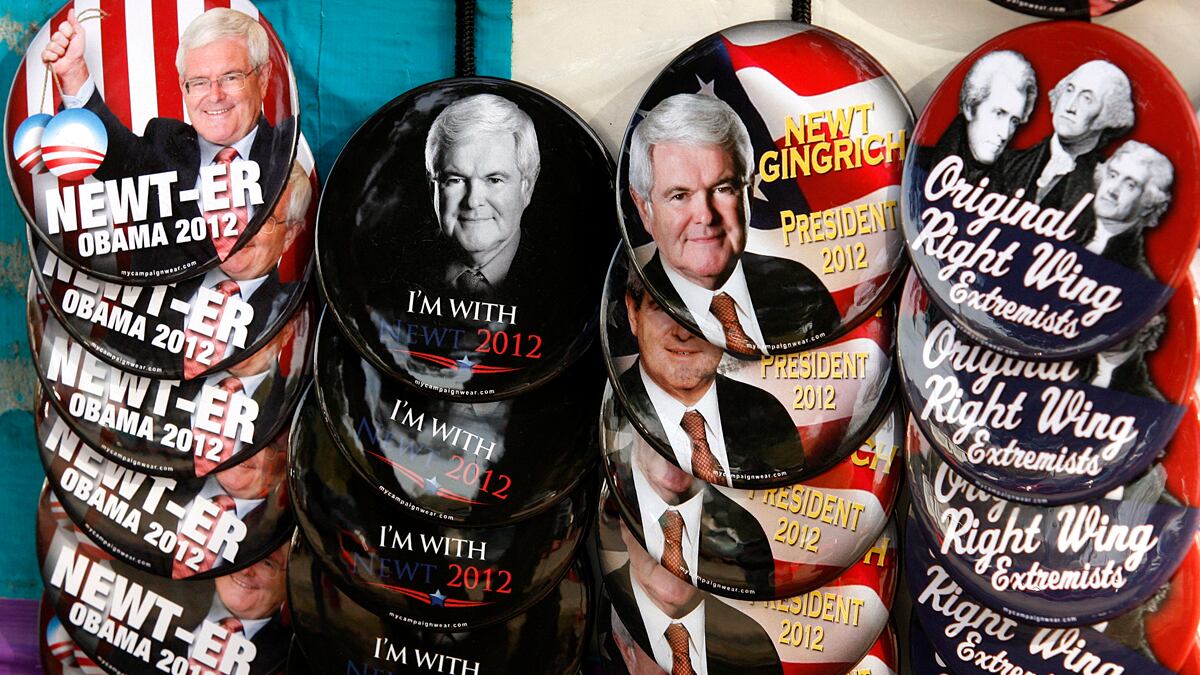Newt Gingrich blitzed the talk-show circuit Sunday morning to declare that he’ll win Tuesday’s GOP primaries in Alabama and Mississippi and regain at least some of the momentum he had coming out of his victory in South Carolina in January. “I think we’ll win both [states],” he told Chris Wallace on Fox News Sunday.

Gingrich has done everything he can to make that happen, essentially forfeiting his efforts in Midwestern contests to focus on a Southern strategy, hunting votes and delegates from South Carolina to Louisiana in hopes of spring-boarding onto victories in Texas and California.
“There is this big, conservative belt that runs through the Southern part of the United States,” R.C. Hammond told The Daily Beast. “And Mitt Romney isn’t going to do well there. That dog don’t hunt.”
Maybe not, but winning in the South alone doesn’t hunt too well either, especially if you’re a Republican. More often than not, a Southern strategy for GOP candidates historically has amounted to a recipe for disaster, not a path to the nomination, if they could not appeal to voters in other regions of the country.
By winning only in Georgia and South Carolina, and focusing his current efforts on Mississippi and Alabama, Gingrich is following in the footsteps of a half-dozen Republicans and Dixiecrats before him, from Strom Thurmond and George Wallace to Barry Goldwater and Mike Huckabee, who all swept the Deep South but lost their nationwide contests—primaries and general elections—based on marginal organizations, regional appeal, limited messages, or all of the above.
In 2008, Huckabee won most of the states in the Deep South but eventually lost the nomination to John McCain. McCain went on to pick up every state in the Deep South but lost North Carolina, Virginia, and the general election to Barack Obama in November.
In 1996, Bob Dole swept every state from Texas to Virginia but lost the general election to President Bill Clinton. Four years earlier, President George H.W. Bush enjoyed a similar sweep in Dixie (except for Georgia) but also suffered a similar defeat to Clinton, whose broader appeal to the rest of the country left Bush as a one-term president.
Even Ronald Reagan had his Southern strategy, sweeping the Deep South and West in 1976 but losing the Northeast and the GOP nomination to Gerald Ford.
Gingrich’s march across the South has been far more Goldwater than Wallace, mostly leaving aside social issues in favor of a message somewhere between “I’m from around here” and “drill baby drill,” a Gulf-friendly promise to open up offshore drilling to help get the country back to $2.50-a-gallon gasoline. He has left the old-fashioned Southern pandering to Mitt Romney and his “cheesy grits,” striking the most moderate tone on immigration of all of the remaining candidates and saying he “doesn’t want to get into it” when asked about recent hot-button issues like contraception.
But even Newt’s Southern strategy has its limits and now looks more like a Deep South strategy. He’s shown alarming weaknesses outside the heart of Dixie and placed well off the lead even in states heavy with evangelicals and conservatives. So far he’s won just two of 25 states, and finished third or fourth in most of the rest. He came in third behind Rick Santorum and Romney in Tennessee and Oklahoma, drew just 14 percent in Saturday’s Kansas caucuses, and finished dead last with just 1 percent of the vote in Wyoming’s contest.
Gingrich is now well behind in the AP’s delegate count, which shows Romney with 454, Santorum with 271, and Gingrich with 107. Even a Deep South sweep, with shutout victories in Mississippi and Alabama and a Louisiana win later in the month, would not close that gap.
But Gingrich insists he’s staying in the race no matter what, saying Republicans deserve an alternative to Romney, who he says is a weak frontrunner, and Santorum, whom he paints as a weak conservative.
“We’ve caught up pretty dramatically and I think we’ll have a good day on Tuesday,” he told CBS’s Bob Schieffer. “I’m committed to going all the way to Tampa.” Of course, there’s no other answer Gingrich can give, and it’s far more likely that it will be Sheldon Adelson, the largest donor to the super PAC supporting Gingrich, who determines when the former speaker exits the race, which will be when Adelson stops writing the checks to keep pro-Gingrich ads on the air.
After winning his home state of Georgia on Super Tuesday, Gingrich called himself the tortoise in the GOP race, describing his rivals as “bunnies” who have come and gone from the frontrunner position. But if Gingrich is a tortoise, he’s starting to look a lot like a Southern painted turtle, a colorful creature with an unusually long lifespan that is, unfortunately, rarely found west of the Mississippi.






